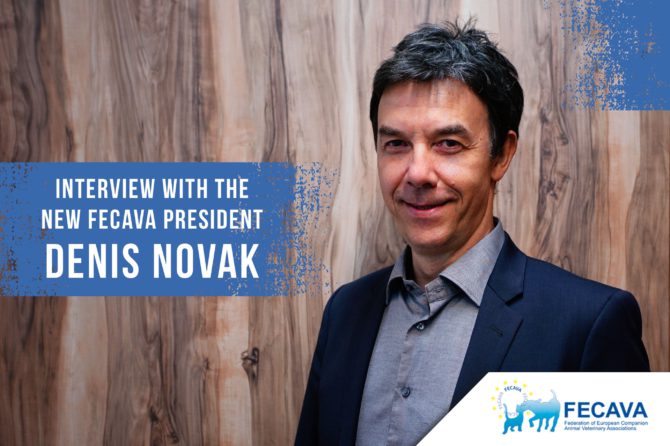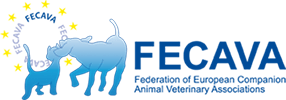
Interview With the New FECAVA President Denis Novak
Could you tell us about your background, what do you do in your everyday life?
I qualified from Belgrade Veterinary School and gained additional postgraduate training in the UK (passing the MRCVS exam), primarily at Cambridge vet school, Bristol and London. My further training in diagnostic imaging of skeletal diseases took place at the Veterinary Faculty in Zurich, Switzerland. I work in a family-owned clinic. We are 8 vets’ clinic and we offer services in all clinical aspects of small animal veterinary care, regardless if it is internal medicine or surgery. We have specialisms in surgery, cardiology, reproduction and obstetrics, clinical pathology and diagnostic imaging. I hold a specialism for the official F.C.I. approved evaluation of the skeletal diseases in small animals such as hip and elbow dysplasia, OCD, spondylosis, etc. We provide the first opinion and see referral cases daily in all disciplines mentioned before. Part of my everyday work is the involvement in veterinary organizations: FECAVA (Federation of European Companion Animals Veterinary Associations), SASAP (Serbian Association of Small Animal Practitioners) and WSAVA (World Small Animal Veterinary Association). I lead the team of EERVC (Eastern European Regional Veterinary Conference) and I am a partner in OKEAN-Veterinary Training System.
Who were your mentors or role models along the professional way that helped you become who you are today?
My life – long mentors are my family and a few closest friends-colleagues with whom I am working in various fields since we met.
Apart from family and closest friends who are vets as well, I have been so lucky and grateful to meet some extraordinary and inspirational people during my career so far.
Ray Butcher, former FECAVA and BSAVA president was the one who helped us re-organize the Serbian Association of Small Animal Practitioners and he was the one who had the most powerful influence on my veterinary career when it comes to the international work for the national regional associations, FECAVA and WSAVA. I am sure that he laid the roots in me, subconsciously, for some other projects like the Eastern European Regional Veterinary Conference (EERVC) a long time ago, before I could even realize it.
Laura Wood and Dragan Tomovic, from Ash Croft Veterinary Surgery near Cambridge, were both my teachers, life coaches, friends, family, mentors, advisors, people who I could rely on whatever was coming my way during the time in the UK.
Jelena Ristic, Brian Catchpole, Alex and Allison German, today well-known experts, helped me a lot at the time by examining my work, preparing me for the exams and our close friendship remains today.
I want to say huge thank you to Joe Morgan, Mark Flueckiger, Bernd Tellhelm, Richard Le Couter, Thomas Flegel, Holger Volk, Dick White, Pete Mantis, June Boon, Michael Willard, Michael Herrtage, Laurent Findji, each of colleagues from SASAP Board since 2005, all FECAVA Board members I was working with and everybody from EERVC Board. They all had a profound influence on me within the projects that we have been working together, still working and beyond. I learned a lot from them about many aspects of our lives and I am still learning, grateful for their friendships.
What motivates you to put extra time and energy to contribute to FECAVA?
I joined FECAVA in 2005 as a SASAP director/representative. I chair working group for the continuing education in Eastern European countries and I was involved in working groups of EJCAP journals (both printed and digital version), financial advisory committee and media/marketing working group. I served 4 years as a treasurer and 2 years as a vice – president in the FECAVA board. It is important to understand that there is no clear division between working groups and initiatives within the FECAVA family and work which has to be done. Many representatives of their national associations are involved in few working groups which brings more benefit to the FECAVA. FECAVA is not much different from any other veterinary organization when it comes to the challenges which lay ahead of it. Staying relevant, both for the smaller and larger national associations is of paramount importance. As times are changing very fast in the world we live in, preserving the financial balance is always something we should care about. All activities should serve to each clinician who will recognize the value of becoming a FECAVA member. I guess that is what motivates me to contribute to FECAVA.
What is your vision of the small animal veterinary profession in Europe in the following years and longterm?
The small animal veterinary profession in Europe, at the same time, has so much similarity and diversity between individual European countries. Considering how many vets are in the small animal field, it is a rather small community but extremely important for the whole society. It is developing very fast and we are witnessing a lot of changes in the way we work now compared to only 5 years before. It would be very ambitious trying to predict how the profession will look like in a few years. At this stage, I would rather see what comes up front and hope to be part of the change for better.
Where do you see most of your contribution as FECAVA President in the following 2 years?
This is an everchanging subject due to the many projects going on already. I would be happy if we manage to finish at least two or three projects during my term. Opening FECAVA to new potential members, strengthening the collaboration with associate members and continuous working on harmonization of our profession within Europe together with FVE, UEVP, veterinary industry, and relevant stakeholders.
You are very active in the development of veterinary postgraduate education in Eastern Europe. What’s the situation in the region at the moment, how it has developed in recent decades and what are the plans for the future?
Eastern European region has both developed and changed for better in the last 20 years. There are opportunities to learn and to broad veterinary perspective in almost every county in the region. Many colleagues are contributing to the whole process of development which is very important. We should continue to work together in exchanging our experiences and raising standards of care for our patients. This is the best award one could get.
The small animal veterinary profession is changing a lot. From mixed practices to veterinary corporations. From mostly male profession to mostly female profession. Young vets can not be prepared for the profession they are entering. What is your message for them?
Since the early beginning of our clinic, we thought that it is of paramount importance for each one of us to try to be a good general practitioner. In my opinion, seeing an animal as a whole is crucial for a positive outcome. We try to pass this approach to younger colleagues, students, and interns. When somebody feels the solid ground as an all-round vet it is much easier to improve in areas of special interests. So far, we proved that this approach is very efficient, as many colleagues, who were trained in our clinic, successfully work within the country or internationally.
Would you share a quote or a thought that reflects your life motto?
It is more complex than one quote or thought and many of them are beyond the scope of this interview. An African proverb that I often think of says: “If you want to go fast, go alone. If you want to go far, go together.” There are times when we need to go fast and there are times when we need to go far. Sometimes we cannot choose which of these we will do more often.
Leave a reply

ČESTITAMO.
ReplyPROŠLI SAZIV KOMORE JE 2013 BEZ OBRAZLOŽENJA SMENIO DENISA, VANJU,IGORA I JOŠ NEKE LJUDE IZ STRUKE KOJI SU HTELI DA UNAPREDE RAD KOMORE, NADAJMO SE DA JE OVO PROŠLOST I DA ĆE KOMORA SLUŽITI STRUCI A NE POJEDINCIMA KAO DO SADA
POZZ I JOŠ JEDNOM ČESTITAMO NA IZBORU A I ONIMA KOJI SU VAS BIRALI